
Jean Baptiste Alphonse Déchauffour de Boisduval was a French lepidopterist, botanist, and physician.

The Heliconiinae, commonly called heliconians or longwings, are a subfamily of the brush-footed butterflies. They can be divided into 45–50 genera and were sometimes treated as a separate family Heliconiidae within the Papilionoidea. The colouration is predominantly reddish and black, and though of varying wing shape, the forewings are always elongated tipwards, hence the common name.

Ceratomia is a genus of hawkmoths. The genus was erected by Thaddeus William Harris in 1839. Species include:

Asterocampa, commonly called hackberry butterflies or American emperors, is a genus of butterflies in the family Nymphalidae found mainly in North and Central America and the Caribbean.

Zygaena is a genus of moths in the family Zygaenidae. These brightly coloured, day-flying moths are native to the West Palearctic.
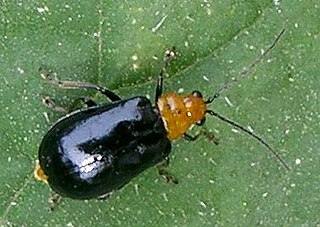
Aulacophora is a genus of beetles in the family Chrysomelidae, commonly known as pumpkin beetles; some species are pests of agricultural crops. The genus was named in 1836 by the French entomologist Louis Alexandre Auguste Chevrolat, in Dejean's Catalogue des Coléoptères. The name, from Ancient Greek, signifies "furrow-bearer"' from aulax, "furrow".

Gonipterus is a genus of weevils in the family Curculionidae. There are approximately 20 described species in the genus, most of which are native to Australia. They are all plant feeders and many are specific to a single host species. Gonipterus gibberus and Gonipterus scutellatus infest a number of species of Eucalyptus and have spread to other parts of the world where these trees have been planted.
Cyrioides australis, commonly known as the dark blue banksia jewel beetle, is a species of beetle in the family Buprestidae native to southeastern Australia. It was described by the French entomologist Jean Baptiste Boisduval in 1835. Banksia integrifolia has been recorded as a host plant.
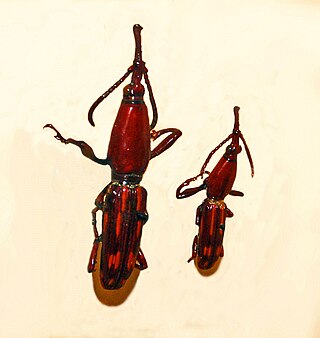
Orychodes digramma is a species of Brentidae family. It occurs in Papua New Guinea. It was first described in 1835 by Jean Baptiste Boisduval within Arrhenodes. it is currently accepted under the genus Orychodes.
Cotyclytus is a genus of beetles in the family Cerambycidae, containing the following species:
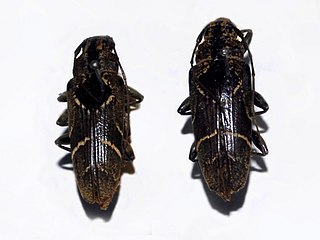
Tmesisternus is a genus of longhorn beetles belonging to the family Cerambycidae, subfamily Lamiinae.
Ancita is a genus of longhorn beetles of the subfamily Lamiinae, containing the following species:
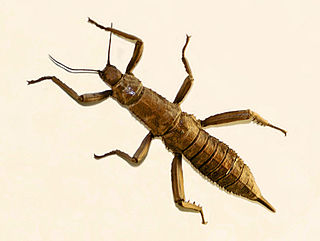
Eurycantha is a genus of Australasian stick insects: typical of the tribe Eurycanthini. It was described by Jean Baptiste Boisduval in 1835.
Clyzomedus fastidiosus is a species of beetle in the family Cerambycidae. It was described by Jean Baptiste Boisduval in 1835, originally under the genus Acanthocinus. It is known from Papua New Guinea, Indonesia, and the Philippines.
Tmesisternus jaspideus is a species of beetle in the family Cerambycidae. It was described by Jean Baptiste Boisduval in 1835.
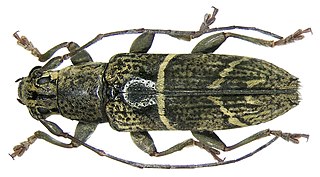
Tmesisternus oblongus is a species of beetle in the family Cerambycidae. It was described by Jean Baptiste Boisduval in 1835. It is known from Indonesia.
Tmesisternus septempunctatus is a species of beetle in the family Cerambycidae. It was described by Jean Baptiste Boisduval in 1835.
Tmesisternus tessellatus is a species of beetle in the family Cerambycidae. It was described by Jean Baptiste Boisduval in 1835.
Tmesisternus unipunctatus is a species of beetle in the family Cerambycidae. It was described by Félix Édouard Guérin-Méneville in 1835.
Amycterus is a genus of weevils belonging to the Amycterini tribe in the family Curculionidae, first described by Carl Johan Schönherr in 1823. The decisions for synonymy are based on work by Alonso-Zarazaga, M.A. and Lyal, C.H.C. and Elwood Zimmerman.










